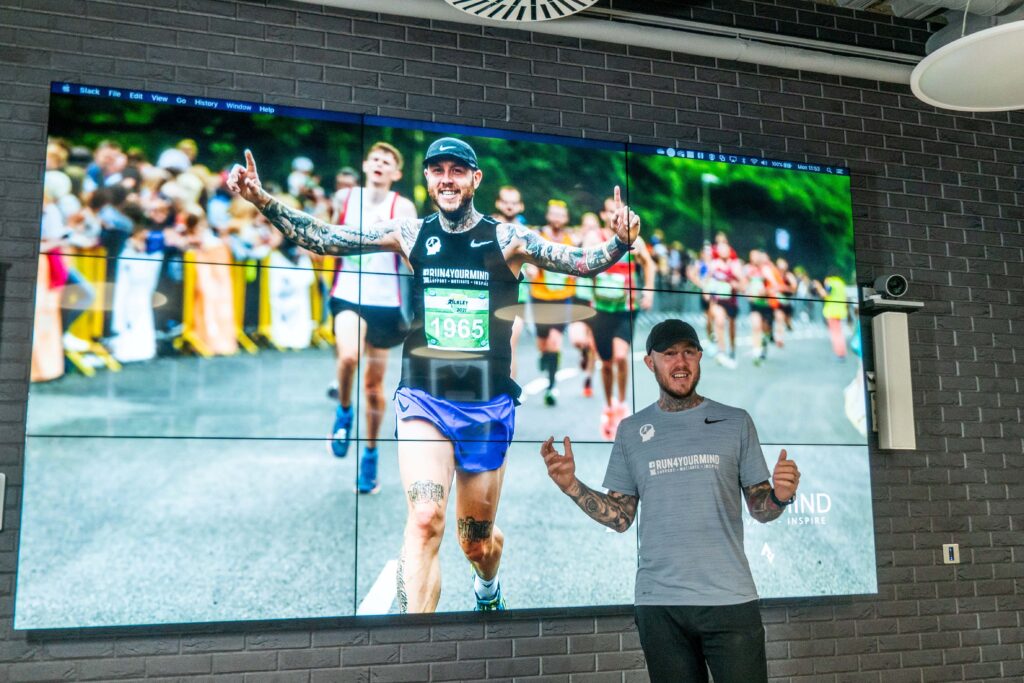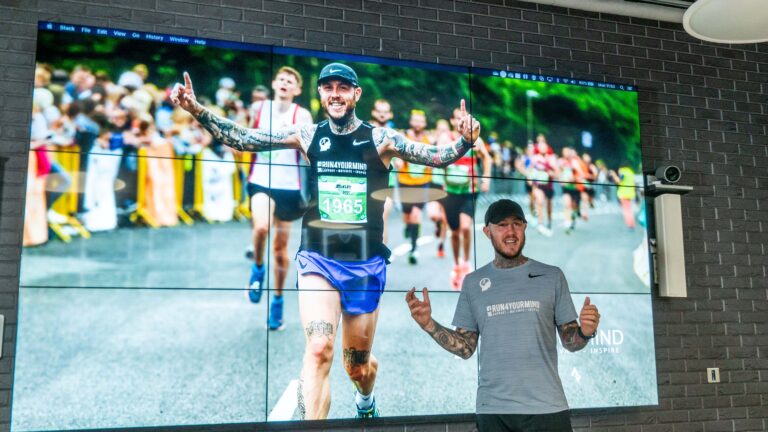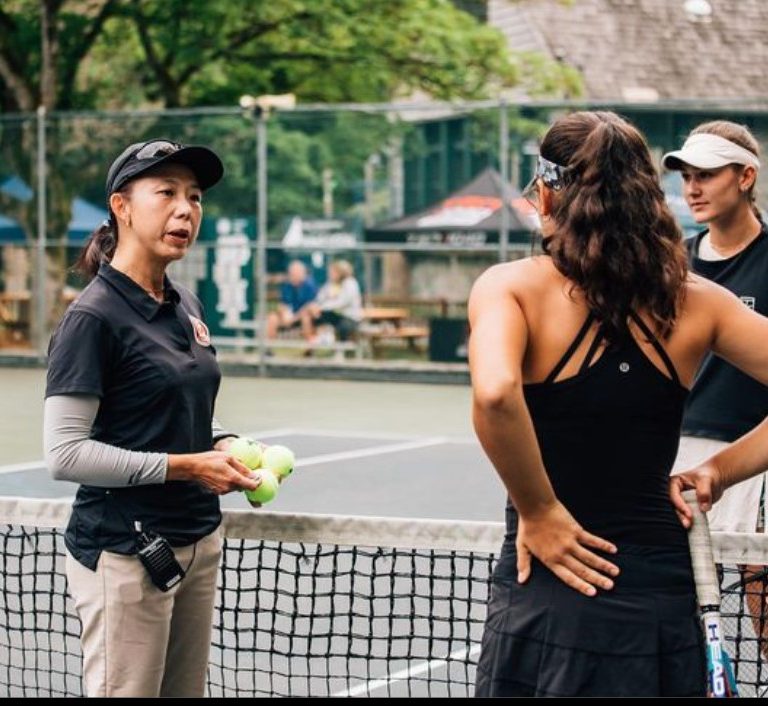
|Joanne Hill – Tennis BC|
Mental health is something that we are, thankfully, talking about a lot more in the sporting community and beyond. It’s taken a long time to get to this point and it’s taken a lot of top athletes speaking out and sharing their journeys for the conversations to begin in earnest. If you follow the top tennis players on TV, you often hear references to mental health in the broadcast, whether it’s the players discussing their personal battles in press conferences or the commentators discussing the very real battles that go on during play in a player’s own headspace. At that level, the pressures may seem obvious, and there are certainly specific issues that come with being in the international spotlight, but even for the youngest player, there are pressures and concerns that come from the sport and from just growing up.
Good Mental Health is Good Health

Any sport at any level presents challenges. Team sports provide a supporting cast, but players also need to fit in with the group as well as perform at a suitable level suitable. Team sports are often more subjective in their selection process and can depend on perceived need within the team among other factors. One of the particular challenges in individual sports such as tennis, is its finite scoring system in which the winner is merit based—which removes the subjective, but which can also bring particular pressures.
While the physical challenges are obvious, the mental ones are less so. Finding ways to share discussions about mental health on and off the field of play is important. For Oly Newton, the best way to open the conversation with kids is by sharing his own story. Oly is energetic and he exudes a positive energy that is infectious! That much is evident instantly. He is also upbeat, empathetic, kind, and open, and really easy to talk to.
From rock bottom…
Like many kids, Oly was an “energetic” kid, in the way that word can be applied to mean too much energy. Most kids have a lot of energy—ask any parent—so it’s important to understand that there’s a distinction. Like many kids growing up when he did, Oly was a kid who needed a lot to be busy with—it turned out that he has ADHD. If focused the right way, ADHD can be a great asset, and of course, there are varying types and degrees of ADHD. Like everyone, Oly struggled with a few stressful things growing up, challenges that were beyond his control as a child. At the age of seven or eight he began to exhibit some symptoms of OCD, (obsessive-compulsive disorder), but he didn’t know it at the time.
OCD can start innocently enough—Oly describes being “superstitious” as a kid. He had certain rituals that he had to perform. He notes that, “I had a great upbringing, but I couldn’t talk about the fact that these rituals were bothering me because I didn’t understand.” Oly notes that around 50 per cent of mental illness starts before you’re 14 and 75 per cent before you’re 21. I don’t want any child to endure what I did, so I’m on a mission to create these conversations.”
The issue with OCD is eloquently described by its name. According to the Mayo Clinic, it “features a pattern of unwanted thoughts and fear (obsessions) that lead you to do repetitive behaviors (compulsions). These obsessions and compulsions interfere with daily activities and cause significant distress.” It becomes a vicious circle as stress makes the condition worse.
Oly, fortunate to have a great family around him, managed to cope with his OCD without it becoming too overwhelming for him. He was an active kid, playing lots of sports, but he stopped exercising when he grew up. By the time he was in his early 20s, he had several great circles of friends whom he loved to bring together. He described himself as “the life of the party!” until an event occurred in his life that affected his friend circles that changed everything for him. He fell into a depression as a consequence of the event, and started to have false, negative, intrusive thoughts—a symptom of OCD. They began to dominate his life and were accompanied by images and urges that tormented him and that he could not control. He tried every option through the NHS (National Health Service) and every therapy. He struggled on with work, but eventually had to sign off from his job on long-term leave, fully supported by his employer. His hopes of finding a way to cope were fading.
…to ultra-marathon!
The day after he had signed off from his job, and feeling that he had hit rock bottom, he decided to go for a run, a decision that he says, “changed my life. Oly was not a runner, but he found that it took the edge off the OCD-fueled anxiety instantly. “It took me from the dark into the light and it has helped me create a life that wouldn’t have been possible without it.” He recognizes running for the short-term fix that it is, but the feeling it gave him, the feeling he describes of normality, was enough to keep him going, and he found that the further he ran, the more mental freedom he gained, so he kept running and running further.
His first race was a big one—he certainly doesn’t shy away from challenge—100km is a long way in car, never mind on foot—but that’s what he did! He runs mostly half marathons now, describing that as his favourite distance and he runs every day. It keeps him grounded.
Blazing a trail to help others
Getting back on track, Oly returned to work. His employer was having an event where you could share an untold story, so Oly shared his journey—and that act of bravery and honesty would lead him onto a new path in his life. After discovering that people were really moved by and interested in his story and realizing that he could make a difference for others by talking about his struggles and how he created positive change in his own life, he knew that he wanted to make a difference.
This desire to create positive change eventually led Oly to create Run4YourMind, a charitable organization to help kids and their parents dealing with mental illness. Oly hopes to inspire, support, and motivate others struggling with mental illness through the power of running. “It all happened big and fast!” he says of finding his feet as a speaker and then founding his own charity. His engagements speaking about his mental health journey started with some amazing opportunities in corporate settings with Microsoft and Burberry and he went on to be hired by other big companies who wanted to hear stories of resilience and lived experience, but he realized quickly that his passion lay in talking to kids and helping them find ways to flourish. Along with working with young athletes, Oly has started to work with school children to help them with whatever they may be dealing with and to create understanding among peers. He does most of his speaking through his business, Lights On Mental Health, while Run4YourMind was recently granted charitable status.
A big part of coping with mental health challenges is knowing that you are not alone and that it’s ok to be you. An outlet for kids with ADHD is sport—it’s a natural fit—but for kids who have OCD, the stress in sports like tennis could amplify symptoms, so talking about what is and isn’t problematic is a good place to start.
Tennis, mental health, and talking it out

Joe Wood, Tennis BC’s Director of High Performance knows the pressures of playing the game and he knows that kids deal with a lot in the modern world. Joe had heard Oly’s story and his mission to make mental health a point of discussion, so when Joe found out that Oly was visiting from the UK, it seemed like a golden opportunity. Oly was a natural fit for the high-performance program at the Tennis BC camp recently held in Whistler, and of course, the answer was yes!
Getting the ball rolling
Oly shared his story with the U14s, and he was impressed with their existing knowledge of mental health issues and their curiosity and acceptance. They discussed things like how to manage stress through the analogy of a “stress basket.” A ball goes into the basket for things that are stressful and if there are too many stressors, the basket overflows. It seems simple, but that is exactly how life feels for all of us at one time or another. How do we release that stress or keep it down in the first place? Oly talked about ways to cope with the stressful things in life and how to know when they are becoming too much. The kids grew to understand that the basket is a different size for everyone, just as everyone is different, and that it can all depend on any number of factors.
The U12s were a slightly different group to address. Oly chose to ask questions of this group to get them talking and it didn’t take long for them to open up. Both Oly and Joe were amazed at the depth of their emotional intelligence around mental health. It’s a good sign because it means that the conversations are happening in more than one venue. The U12s got the chance to discuss the things that they struggle with and also understand that they are not alone!
Shared differences
Because Oly is so open, he creates a safe space for talking about tough things. The kids opened up and talked about what stresses them in daily life. So, what is stressful for U14 and U12 tennis players? It’s a little bit of everything! Friends, parents, exams, bullying, players who cheat, financial issues, pets, siblings. You get the idea! One of the most important takeaways for the kids was learning that everyone has similar concerns and that many share “superstitions” on the court, like not stepping on the lines, or bouncing the ball a certain number of times, or needing to have the same ball back to serve with. It’s common across the sporting world—ritual can be calming and can help athletes focus when they have to.
Everybody’s journey is different, and everyone is dealing with something, whether directly or indirectly—appearances can be deceiving! In our chat, Oly draws attention to our cultural tendency to ask, “How are you?” without expecting an answer that goes beyond, “Fine.” He encourages kids to speak out when they are struggling, and he also encourages people to ask twice about how someone really is. He quotes his friend saying, “We need to learn to become comfortable with being uncomfortable!”
Oly describes his own story as an “ongoing journey of constant recovery,” and it’s an excellent description of his path. Resilience is a word that we hear a lot, but true resilience is built over time. It’s the bumps in the road that can be smoothed over if we are resilient and have the right coping mechanisms and support networks, or it’s those very same bumps that can grow to become insurmountable if we don’t have the right tools to build with. Just as it takes courage to stand up and tell your story, it takes courage to ask, “Are you OK?” and it takes courage to say, “I need to talk.”
To find out more about Oly’s story and his passion for helping others find better mental health, check out Lights On Mental Health, or follow his blog Run4YourMInd here.



